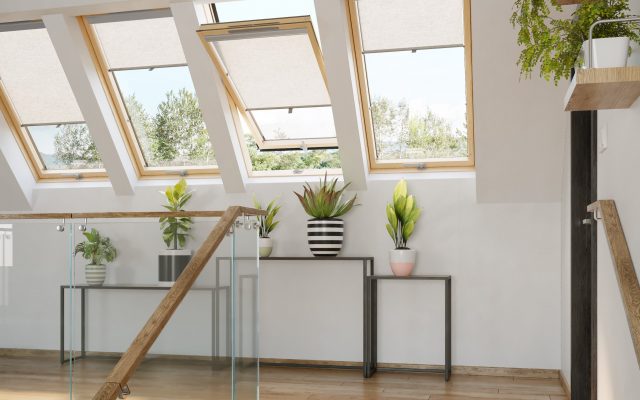If you’re a skilled roofer, starting your own business could be a great way to make more money, be your own boss and feel more independent. However, learning how to start a roofing company can feel like a mammoth task. There are a lot of things that you need to consider, from registering with the government to ensuring you abide by all the necessary guidelines and laws.
As experienced roof window providers, we’ve worked with a lot of roofers over the years, and are always keen to see more take up the challenge of starting a business. In this guide, we’re going to take a look at what you need to consider when figuring out how to start a roofing business. If you’ve ever wanted to start your own company, this is the guide for you.

It All Starts With a Plan
Before you can start your roofing company, you need to put a business plan in place. Writing a business plan can seem complicated, but it’s actually quite simple. Your business plan needs to include the following elements:
- Where you are and your vision for the business
- Realistic and specific goals for your business
- Your customer profile – are you going to work for individuals, businesses, both?
- Your main competitors
- Your finances and how you intend to fund your business
- Market analysis
- Your marketing plans
Business plans are key for a number of reasons. Firstly, it gives you an idea of what you want to achieve and whether it’s realistic. Secondly, it’s required if you want to get a business loan from a bank or the government. Finally, it allows you to see any issues that your business may encounter in advance.
Get Qualified
While you don’t necessarily need to be qualified to work as a roofing contractor, it might reflect badly on you if you’re not. Being able to list qualifications on your adverts will foster confidence in your potential customers.
For instance, if you’ve completed an intermediate or advanced apprenticeship, mention this on your advert. Similarly, if you’ve completed a Level 2 or 3 Diploma in slating or other roofing occupations, mention this. Getting an NVQ is a fantastic way to bolster your profile and attract new clients.
Register Your Business
Now that you’ve got a plan, and you’re qualified, it’s time to register your business with the government. This is an important step to complete before you start work, as you’ll need to have registered to pay tax and national insurance.
While there are several different types of company structures you can register as, you’ll likely register as either a sole trader or a limited company. Both of these have pros and cons, so let’s take a closer look to help you decide which is right for you.
Sole Trader
Setting up as a sole trader is the easiest way to tell the government that you’re self-employed and is very common. Being a sole trader means that everything in the company belongs to you, and it’s not legally distinct from you. You don’t need to split profit with anyone and it’s easy to register as a sole trader with HMRC.
However, there are downsides, the most significant linking back to the business not being distinct from you. If your business goes into debt, you are responsible for those debts – you have unlimited liability. If someone sues your business, they will be suing you directly, and you’ll be on the hook for any legal penalties.
Limited Company
A limited liability company, commonly known as a limited company, is a little more difficult to set up, but has some fantastic advantages. Instead of simply registering with HMRC, you’ll need to register with Companies House. A limited company also needs to pay corporation tax on any profits, and you’ll need to set up payroll to pay yourself a salary, as well as paying income tax and national insurance for yourself and any other employees.
This all sounds very complicated, but once you’re up and running, you’ll find one massive advantage right away: as the company is distinct from you, you are not (in most circumstances) responsible for its debts. If someone sues the company, they are not suing you as an individual.
If you’re not sure whether a limited company is right for you, don’t worry, you can always change your company’s structure later on.
Getting Insured
Being insured is one of the most important aspects of learning how to run a roofing business. There’s only one form of insurance that is compulsory, Employers’ Liability insurance, which you must have if you’re an employer. However, this isn’t the only insurance that you should have.
For instance, public liability insurance is a vital safety cushion that will cover liability towards customers and members of the public, as well as any third parties that you work with.
Buying Equipment

Now that you know the basics of setting up, it’s time to get into the practical side of starting a roofing business. You’ll need to buy equipment to perform your job – while you might have some of these, consider this a checklist for your business:
- A van
- Ladders
- Safety harnesses
- Protective gear such as non-slip shoes and gloves
- Nail guns
- Tape measures
- Roofing knives
- Tin snips
- A staple gun
- A circular saw
Finding Work
If you’ve always been an employee, it can be tricky to know how to find work. Thankfully, it doesn’t need to be hard.
Advertising your business online, on noticeboards and in local newspapers is a great way to spread the word about your company. You should also keep an eye on buildings in your local area, such as homes, pubs, schools, and council buildings. If you notice any flaws in their roofing, don’t be afraid to reach out to them with your contact details.
It’s a good idea to create social media accounts for your business, showing off any work that you’ve done. You should also create a business website or hire someone to do so, this is essential in modern business.
Getting Paid
While it’s tempting to get paid directly into your personal account, this makes things a lot more complicated when it comes to tax and record-keeping. Instead, you should start a separate business bank account - this is the account where you’ll store your business’ income, before paying yourself from it.
You should make sure that whenever you do work for a client, you get a contract signed. There are many different templates online to help you create contracts for your clients, and this will give you some important evidence if the client refuses to pay.
Once you’ve completed the job, you’ll need to invoice your client. You should store all of your invoices permanently, as well as contracts. On the invoice, you’ll need to list key information about your business, such as its name, trading address and contact number. You’ll also need to come up with a unique reference number for the invoice, as each invoice (even for different clients), needs a different number.
You should also include the date, your company’s registration number, VAT registration number, and the client’s name and details.
Further down the invoice, you’ll need to add details of services provided and each service’s price, before adding a total. To make payment easy for your client, add your business account details and give them a reference number.

Staying Safe at Work
There is one more important thing to bear in mind when you’re starting a roofing company: safety. There are many different health and safety regulations that you’ll need to abide by at your company. For example:
- You should make sure to use debris netting to ensure the safety of those below you
- You will need to know and understand pylon’s exclusion zones
- You’ll need to understand the rules around working near gas flues
This list is by no means exhaustive. For a more thorough understanding of the guidelines, you should read the Health and Safety Executive’s guide to health and safety for roofers.
Conclusion
Starting a roofing business offers you some fantastic advantages. You get to be your own boss, potentially make more money and set your own hours. However, it also comes with a lot of responsibilities and the need for qualifications. If you do decide to go into business, DAKEA will be happy to help you – we sell roof windows and offer discounts to tradespeople.
How to Start a Roofing Company: FAQs
Starting a business is a big decision, and we understand that you may have a lot of questions. In this section, we’ll answer some of the most common questions that hopeful and new business owners have.
How Much Do Self-Employed Roofers Make?
While potential earnings will vary depending on your level of expertise, business area and the services that you offer, roofers can make around £66,000 per year before tax. If you decide to employ other roofers, this can increase further.
Do Roofers Need a Licence?
In the UK, roofers do not require any specific licence to trade. However, if you intend to do technical jobs such as asbestos removal, you will likely need a licence.
Can You Work All Year Round as a Roofer?
Roofers shouldn’t work in dangerous conditions, but thanks to the UK’s temperate climate, you should be able to work at most times of the year.


